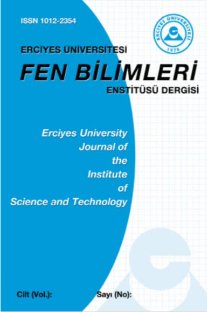Doğal gaz ve petrol sistemlerinden kaynaklanan metan emisyonlarının analizi: 1990– 2010
Antropojenik sera gazı emisyonlarının atmosferdeki konsantrasyonları, son yıllarda önemli ölçüde artmıştır. Bu artış, sera gazı etkisinin de artmasına yol açmıştır. Sera gazlarından biri olan metan (CH4), çeşitli kaynaklardan açığa çıkmakta olup, atmosferdeki konsantrasyonu son birkaç yüzyılda çarpıcı bir biçimde artmıştır. Doğal gaz ve petrol sistemleri, atmosferdeki konsantrasyonu hızla artan metan emisyonlarının önemli kaynaklarından biridir. Bu nedenle, bölgesel ve ülkeler bazında metan emisyonlarına sebep olan birincil kaynakların belirlenmesi önem arz etmektedir. Bu çalışma, doğal gaz ve petrol sistemlerinden kaynaklanan metan emisyonlarının 1990–2010 yılları arasındaki değişimi incelemektedir. Çalışma, metan emisyonlarındaki değişimi coğrafik ölçekte analiz etmektedir. Sonuçlar, Avrupa Birliği’ne üye olmayan ülkelerin küresel metan emisyonlarına sebep olan ülkeler içerisinde en büyük paya sahip olduğunu göstermektedir. Bu ülkeler içerisinde, en yüksek paya sahip olan ülkenin Rusya Federasyonu olduğu ve bu ülkenin bölgedeki metan emisyonları değişimi açısından baskın ülke olduğu belirlenmiştir. Avrupa Birliği’ne üye olmayan ülkelerin ardından, OECD ve Avrupa Birliği’ne üye ülkeler metan emisyonlarına en fazla sebep olan ülkelerdir. Bu gruplar içerisinde, Birleşik Devletler emisyonların çoğunluğundan sorumludur. Çalışmanın sonuçları ayrıca; doğal gaz ve petrol sistemlerinden kaynaklanan metan emisyonlarının, kullanılan ekipmanların yenilenmesi, yönetim prosedürlerinin iyileştirilmesi, havalandırmanın azaltılması gibi yöntemlerle neredeyse % 100 oranında azaltılabileceğini göstermiştir.
Anahtar Kelimeler:
Doğal gaz, Petrol, Metan emisyonu, Azaltım
Analysis of methane emissions from natural gas and oil systems: 1990-2010
The concentrations of anthropogenic emissions of greenhouse gases (GHG) in the atmosphere have considerably increased in recent years. This has caused to an increase in the greenhouse effect. Methane (CH4), one of the greenhouse gases, is emitted from a variety of sources and its concentration in atmosphere has increased dramatically over the last few centuries. Natural gas and oil systems are one of the important sources of methane emissions whose concentration in atmosphere has rapidly increased. It is, therefore, highly important to determine the primary sources of emissions in terms of regions and countries. This paper examines the methane emissions from natural gas and oil systems from 1990 to 2010. It analyses the changes in methane emissions on the basis of geographic scale. Results indicate that the non-European Union nations had the biggest share in global methane emissions. Between these nations, Russian Federation was the highest emitter and its natural gas emissions dominate the region’s emissions. Following the non-European Union nations, OECD countries and current members of the European Union were the next biggest contributors to the emissions. The United States was responsible for the majority of emissions in this group. Results also showed that these emissions can be decreased by nearly 100% using technology or equipment upgrades, improving management practices and operational procedures to reduce venting, enhancing management practices.
Keywords:
Natural gas, Oil, Methane emission, Mitigation,
___
- El-Fadel, M., and Massoud, M., Methane emissions from pollution, 114, 177-185, 2001. environmental
- Buchdahl, J., et al:, Global warming. Available at:http://www.ace.mmu.ac.uk/Resources/Fact_Sheet s/Key_Stage_3/Global_Warming/pdf/Global_Warmi ng.pdf, 2002- accessed on 22 Aug., 2009.
- Aydin, G., et al., Evaluation of geologic storage options of CO2: applicability, cost, storage capacity and safety, Energy Policy, 38 (9), 5072-5080, 2010.
- Milich L., The role of methane in global warming: where might mitigation strategies be focused?, Global Environmental Change, 9, 179-201, 1999.
- IEA., Energy sector methane recovery and use¸ available :http://www.iea.org/papers/2009/methane_brochure. pdf¸ accessed on 11 Feb 2010. at
- Karakurt, I., et al., Mine ventilation air methane as a sustainable Sustainable Energy Reviews, 15 (2), 1042-1049, 2011. source, Renewable and
- Kemfert, C., and Schill, V:, An analysis of methane mitigation as a response to climate change, available at: http://fixtheclimate.com/uploads/tx_templavoila/AP _Methane_Kemfert_Schill_v.5.0.pdf, accessed on 25 Dec 2010.
- EPA., Global anthropogenic non-CO2 greenhouse gas at:http://www.epa.gov/nonco2/econ- 1990-2020, available available at:http://www.ipcc
- Aydın, G., and Karakurt I., The regional analyses of global methane emissions from energy sector by different International Mining Congress and Exhibition of Turkey, Antalya, Turkey, 629-637, 2009. 21st.
- Schlagenhauf, M., et al., Methane from oil and gas operations - a source of free fuel for on-site generation?, http://www.powergenworldwide.com/index/display/ articledisplay/314983/articles/cogeneration-and-on- site-power-production/volume-8/issue- 6/features/methane-from-oil-and-gas-operations-a- source-of-free-fuel-for-on-site-generation.html, accessed on 09 May 2010. at: 17. IPCC., Energy, available at:http://www.ipcc
- nggip.iges.or.jp/public/gl/guidelin/ch1ref8.pdf,
- accessed on 09 May 2010.
- Höglund-Isaksson, L., and Mechler, R., The GAINS model for greenhouse gases: emissions, control potentials and control costs for methane,available at:http://www.iiasa.ac.at/rains/reports/ir-04-078.pdf, accessed on 12 Jun 2009.
- Anon., Methods for estimating methane emissions from natural gas and oıl systems, available at: http://www.p2pays.org/ref/17/ttn/volume08/viii03.p df, accessed on 10 Jul 2008.
- Harrison, R.M., et al. Methane emission from the natural gas industry, available at: http, accessed on 23 Jul 2007.
- IPCC. Fugitive emissions from oil and natural gas activities, nggip.iges.or.jp/public/gp/bgp/2_6_Fugitive_Emissi ons_from_Oil_and Natural_Gas.pdf, accessed on 12 dc 2009. at:http://www.ipcc
- Robinson, D.R., et al., Methane emissions mitigation options in the global oil and natural gas industries, available at:http://www.coalinfo.net.cn/coalbed/meeting/2203/ papers/naturalgas/NG020.pdf, accessed on 12 Dec 2009.
- Fernandes, R.L., Overview of oil and gas sector methane emissions and potential projects, available at:http://www.methanetomarkets.org/m2m2009/doc uments/events_oilgas_20041115_fernandez.pdf, accessed on 28 Jul 2007.
- Tingley, K.A., and Fernandez, R.L., Methods for reducing methane emissions from natural gas systems, at:http://www.coalinfo.net.cn/coalbed/meeting/2203/ papers/naturalgas/NG019.pdf, accessed on 15 Jun 2009. available
- Aydın, G., et al., Analysis and mitigation opportunities of methane emissions from energy sector. Energy Sources, Part A: Recovery, Utilization, and Environmental Effects, in press, DOI: 10.1080/15567031003716725
- Fernandes, R., et al:, Cost-effective methane emissions reductions for small and midsize natural gas at:http://www.icfi.com/Markets/Environment/doc_fi les/methane-emissions.pdf, accessed on 12 oct 2008.
- Anon., Oil and natural gas system methane recovery and at:http://www.globalmethane.org/documents/oil- gas_fs_eng.pdf, available accessed on 12 Dec
- ISSN: 1012-2354
- Yayın Aralığı: Yılda 3 Sayı
- Başlangıç: 1985
- Yayıncı: Erciyes Üniversitesi
Sayıdaki Diğer Makaleler
Zehra KAYA, Naciye Gülkız ŞENLER
Optik örgü kumaşların sararma problemleri
Meliha Oktav BULUT, Yasemin AKBULUT
3.6 kW gücündeki fotovoltaik generatörünmatlab simulink ile modellenmesi
Düşey doğrultudaki yapı düzensizliklerinin incelenmesi
Doğal gaz ve petrol sistemlerinden kaynaklanan metan emisyonlarının analizi: 1990– 2010
Gökhan AYDIN, İzzet KARAKURT, Kerim AYDINER
Taner ALATAŞ, Mustafa Ethem KİZİRGİL
Farklı geometrilerdeki köprü kenar ayakları etrafındaki hız dağılımının sayısal incelenmesi
